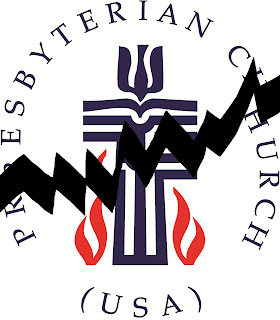With our denomination having recently approved an amendment allowing practicing homosexuals to be ordained as ministers within the church, there's been a lot of talk about what our congregation wants to do next: stay but be in willful disobedience of the denomination's tenets, jump ship to another denomination, or any number of new middle-ground options percolating around.
It's an important decision for a lot of important reasons, but for me it boils down to what will allow me to explain to a normal non-churched person (who couldn't care less about denominational finagling) why we're standing where we're standing. The typical non-churched person, if they think about modern Christians at all, hears one of two messages regarding homosexuality and the church:
(1) Blanket condemnation because homosexuality is a sin.
(2) Loving acceptance because God is love.
These are simple positions to understand and they represent the totality of most people's perception of where the church is on this issue. They are also damagingly wrong.
I don't know where we're going to end up as a congregation. But wherever it is, I want to be able to explain, in simple terms, why we ended up there, and in doing so presented a better message than the two above regarding homosexuality and the church.
73-91 born SEA lived SJC 00 married (Amy) home (UCity) 05 Jada (PRC) 07 Aaron (ROC) 15 Asher (OKC) | 91-95 BS Wharton (Acctg Mgmt) 04-06 MPA Fels (EconDev PubFnc) 12-19 Prof GAFL517 (Fels) | 95-05 EVP Enterprise Ctr 06-12 Dir Econsult Corp 13- Principal Econsult Solns 18-21 Phila Schl Board 19- Owner Lee A Huang Rentals LLC | Bds/Adv: Asian Chamber, Penn Weitzman, PIDC, UPA, YMCA | Mmbr: Brit Amer Proj, James Brister Society
Subscribe to:
Post Comments (Atom)
Drive Has Always Been the Difference
Last month Google announced “Learn Your Way,” which they state will revolutionize the educational experience by providing you...

-
PHILADELPHIA NAMED BEST CITY FOR NEW GRADS How about Philly besting Boston, New York, Chicago, Atlanta, and every other city in America for ...
-
I recently had a humorous but telling incident on my bus ride into work. It being rush hour, the vehicle is often crowded and even standin...


2 comments:
Lee- I need to chime in here, since I follow this issue rather closely as well. I'm a little puzzled by:
"...be in willful disobedience of the denomination's tenets..."
Which tenet exactly would Woodland be at risk for disobeying? The amendment *removes* a denomination-wide requirement that every person in every church in every presbytery who would be ordained (i.e. as elder or deacon) must "be celibate or in a marriage of one man and one woman". No church in *any* presbytery would be forced to ordain anyone that they didn't want to ordain.
The new rule leaves each presbytery to draw up their own "requirements" or "standards" for ordination. And any standards developed would be "re"-strictive, not "pre"-scriptive. If there was a clear consensus at Woodland that people in an actively sexual relationship with a member of the same sex should not be the pastor of Woodland, or an elder or deacon at Woodland, then those people should not be nominated for ordination at Woodland, or, if already ordained by some other church, should not be nominated to pastor the church or join the session or deacon board of church. No one-- not the Presbytery, not the Synod, not the General Assembly-- could *force* Woodland to ordain or install someone against the congregation's will. (This is actually stated explicitly in the constitution.)
What the new constitution *does* do is prevent a prosecution from being brought to overturn the ordination of someone that a church wished to ordain, such wish having been expressed by a vote of the congregation in question.
Joel, I'm almost certain you know more than I do on this, so please correct me if necessary, as I may have the facts wrong. My understanding is that there is the possibility in the future that we would be faced with the choice of doing something we don't want to do (re: ordaining a particular candidate) vs. not doing it and thus being insubordinate to the presbytery. More broadly, if we have a fundamental disagreement with their rules, it is disingenuous for us to continue to say we are under their authority. Hence, the nervousness about just staying put and hoping nothing happens. Not sure that necessary causes us to choose one option over another, but just expressing the increasing discomfort with the status quo.
Post a Comment